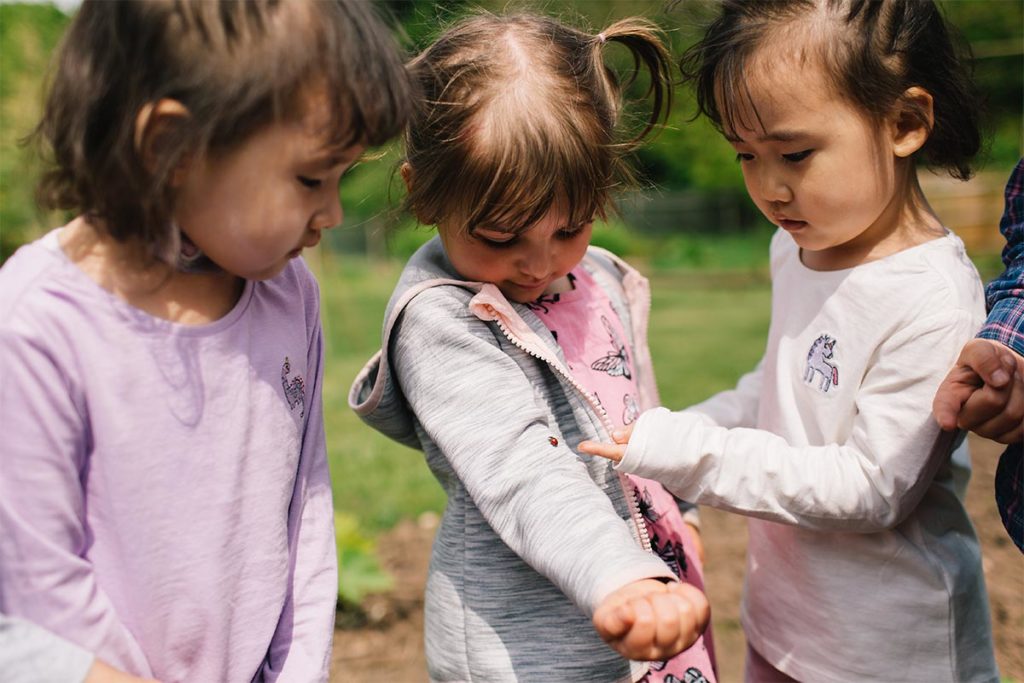The Maples Day Nursery: the first three months

The Maples Day Nursery is three months old!
These early stages have flown by for manager Heather Bench and her dedicated team, and the nursery is now bustling with life. We caught up with Heather to hear the story behind this unique setting, which is working towards full Curiosity Approach accreditation.

Hi Heather! Where and when did you first hear about the Curiosity Approach?
The University is always looking forward, and this is something we as a day nursery want to continue to support.
The Curiosity Approach was first brought to me by one of the day nursery teachers here at the University a couple of years ago. We have a shared passion for sustainability, and also acting ‘in the moment’ with regards to children’s interests feeding their knowledge.
The accreditation seemed the perfect basis for a new day nursery and we have been lucky enough to spend some time with its founders, who are now a worldwide success! The authenticity of our resources fits well into our spontaneity and enjoyment of the early years and been a huge success so far. It was a great pleasure to have Stephanie and Lyndsey from the approach cut our ribbon and officially open us on February 8 2019.

What’s different about The Maples?
We’re still Ofsted registered, and we still apply the Early Years Framework – but our practice is innovative. It looks at the way children learn best and helps them to follow their own curiosity to develop skills and knowledge.
The setting looks unique due to the reduction in to overwhelming colours, sounds and even smells. It’s a sensory approach, which appreciates all elements of the care we provide, including the way we support families and their children become part of our community.

One of the big changes is how we plan.
Instead of using planned activities and tasks which has been traditionally used in early years, we plan in the moment. Knowledgable practitioners look at how the individual learns, and what they are interested in, and builds on this ‘in the moment’. For behaviour at the Maples, this means the setting radiates calmness and warmth. Children aren’t fighting against routine and the restriction of specific activities.
Practitioners are always responding to what children are interested in, at the time they are interested in it.
For example, one of the children had been to a circus and is currently fascinated with movement- so we used a big reel that we’d been donated to do ‘circus tricks’ in the hallway. There are not many homes that could accommodate this so children come here for a unique experience.
View this post on Instagram
Today, the children are taking old electronic devices apart: they’d had fun with deconstruction the day before, so we pulled some recycled equipment out of storage for them. The nursery always tries to reduce, reuse and recycle where possible, avoiding waste in line with our sustainability policy.
How do you manage risk safely?
There is a huge difference to the way in which young children are exposed to risk now – and it’s crucial to safe childhood development to enable them to explore and create.
With this in mind, our practitioners use their ideas, coupled with authentic resources, but this is not without due consideration.

There are risk assessments in place, and the children are supervised in smaller groups when accessing this sort of play to allow them to get used to the weight, and also the cause/ effect.
Our toys are not exclusively used for one purpose: we have lots of loose parts which allow creativity in what young children do here.
Sustainability is something you focus on at The Maples. How’s that working out?
Really well! We’re using significantly less plastic than at any standard nursery.
With nappy changes, kitchen clean-up and so on, a nursery for 80 to 100 children might go through 800 disposable gloves per day. We use them for soiled clothes and bodily fluids for hygiene reasons, but just one, on the hand coming into contact. We use washable aprons at mealtimes and nappy changes, which are cleaned and sterilised between nappies. We use reusable wipes too, so no cotton wool or plastic wipes are going into landfill.
We haven’t had a single complaint from parents about taking wipes home for washing. No one’s surprised by the concept – I think we’re all trying to do more in our everyday lives to be more sustainable.
The Maples is next door to Winterbourne House and Garden. How often do you visit?
Every day! The children head off with magnifying glasses into the woods behind Winterbourne on treasure hunts, looking for fairy clothing or just to explore nature. We plan to keep taking them every day.
View this post on Instagram
We’re doing lots in our own garden area too, as we work towards a Royal Horticultural Society gardening award. The children are learning all about insects and bees, and how important they are to our environment.
The Maples is a unique nursery. How have parents responded to that so far?
Parents love that’s it’s different from the usual environment.
More than that, I think they really respond to how we view them. We’re welcoming a whole family, not just a child. We see them as a whole, respecting their views and offering lots of flexibility about how children settle in.

Maintaining that feeling of family is central to everything we’re trying to do. It’s all a bit more homely. It’s not a business venture: it’s a venture of passion.
Thanks for chatting to us, Heather!
The Maples Day Nursery still has some child spaces available for children aged 2 to 4. Find out more about the Maples here, and book a visit today.